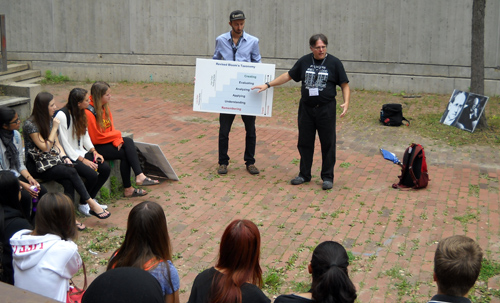
There’s more to business than dollars and cents. That was Trent Tucker’s message to hundreds of first-year business students during inaugural “Captains of Industry” class tours in early September intended to introduce business concepts by highlighting campus history.
Sporting a portable microphone and loudspeaker and referring to enlarged photos of early campus luminaries, the professor in the School of Hospitality, Food and Tourism Management discussed business practices, ethics, networking and innovation during 40-minute tours for seminar groups in his Management 1000 class.
The class numbers almost 900 students in 20 seminar sessions.
Tucker came up with the idea for a walking tour linking commerce and U of G history while pondering ways to introduce business concepts and the campus to first-year students.
“This is just Plato and the olive grove, except I’ve subbed in a PA system and Coroplast signs,” he says.
Standing in Branion Plaza, he tells his listeners to start thinking now about business opportunities.
Look at those students selling and buying textbooks near the cannon. How do buyers and sellers connect? How is the transaction done? Who sets prices and how? “Commerce is going on all around us,” says Tucker.
But there’s more going on in the world of commerce than strict buying and selling, he adds.
Take Albert Thornbrough, former president of Massey Harris Ferguson. He solicited funding for the engineering school on campus now bearing his name, and served on the University’s inaugural Board of Governors.
During Thornbrough’s tenure with the farm equipment manufacturer beginning in the 1960s, the company grew rapidly worldwide. By the late 1980s, says Tucker, Massey Combines Corp. based in Brantford, Ont., became insolvent.
“There’s a lot to learn from failure analysis. Business is a human investment.”
Business is also driven by innovation, he says.
Shortly after U of G was established in 1964, Thornbrough helped acquire a donation from Samuel McLaughlin, philanthropist and former president of General Motors of Canada. McLaughlin gave more than $1 million toward construction of today’s campus library.
In the early 1900s, Samuel and his brother George were still making horse-drawn carriages for their family business. Spotting a new market opportunity, they began turning out cars instead.
Innovation continues, says Tucker, with electric vehicles now gaining market share. This month, Toyota announced that it has sold 100,000 hybrid vehicles in Canada.
He points out a photo showing Johnston Hall during the Second World War, when part of the campus was fenced off for training by Canadian forces. Consider broader philosophical questions, says Tucker. “Who owns the University and what should we teach?”
Another photo depicts Sir William Macdonald, a Montreal tobacco magnate and philanthropist who donated funds for campus building projects in the early 1900s.
That money paid for construction of the Macdonald Consolidated School – now the Macdonald Stewart Art Centre – as well as the Macdonald Institute and Macdonald Hall. Macdonald Hall is undergoing renovations to become the new home of the College of Business and Economics in 2015.
Referring to Macdonald’s donation of tobacco proceeds a century ago, Tucker asks his students a rhetorical question: “Would the University of Guelph take his money today?”
Near Massey Hall, Tucker discusses Kolb’s experiential learning cycle and Bloom’s taxonomy.
He also tells the class about a chance meeting on a Toronto streetcar in the late 1800s between James Mills, then president of the Ontario Agricultural College (OAC), and Walter Massey, president of farm equipment maker Massey-Harris.
Mills asked Massey for a donation for OAC buildings. Three months later, the men met up coincidentally on another streetcar. Massey told Mills his family had decided to fund a library. That led to construction of Massey Hall, the original campus library.
The lesson for Tucker’s students: “Business is a human pursuit. It’s about relationships, networking.”
His last photo shows early Macdonald Institute students tending garden plots on campus. The lesson? You can’t learn only by reading or sitting in a classroom. “You learn about business by doing business.”